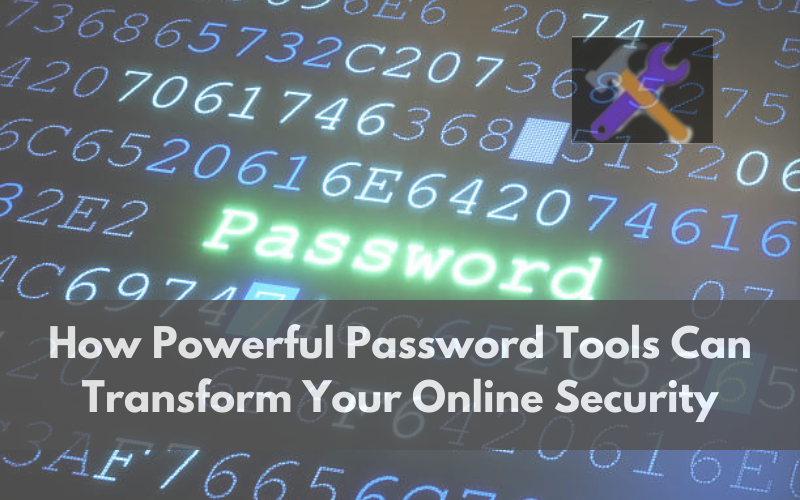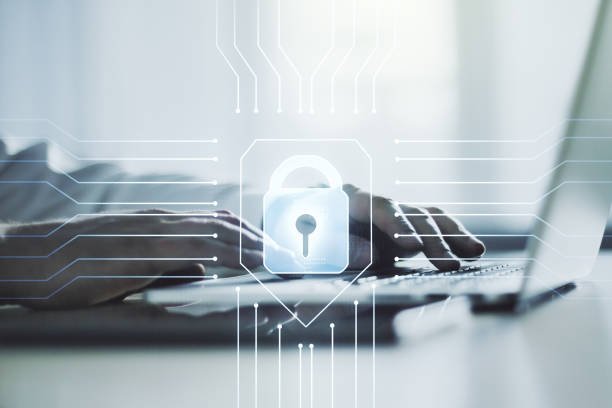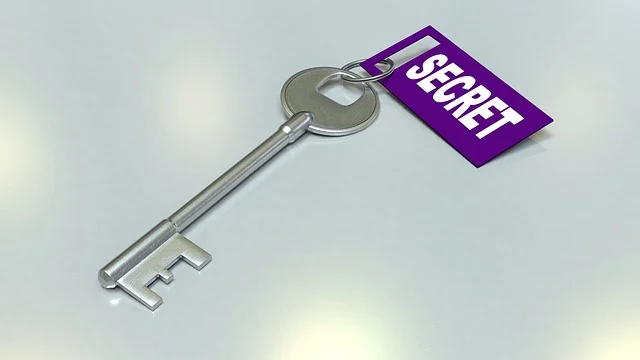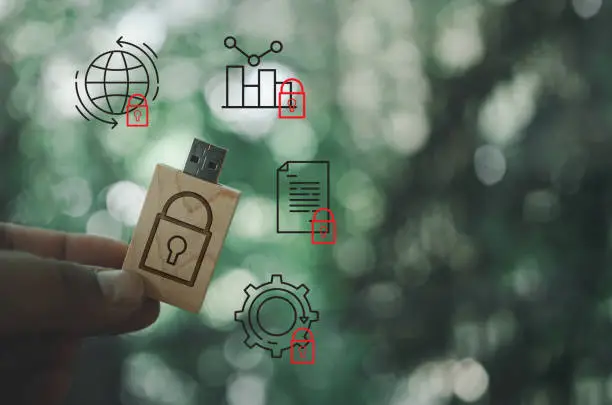
How Powerful Password Tools Can Transform Your Online Security
In this fast-paced era of interconnectedness, where every click and keystroke propels us further into the boundless realm of the internet, safeguarding our virtual sanctuaries has never been more crucial.
Imagine having an impregnable fortress that shields your personal information from the prying eyes of cyber villains.
Well, guess what? The magic key to fortify your digital castle is none other than the humble yet mighty password.
Ah, but not just any password will do. We're talking about the transformative power of cutting-edge password tools that can metamorphose your online security landscape.
From the days of scribbling passwords on sticky notes to harnessing the potential of complex algorithms, we're embarking on a journey to explore how these powerful tools can redefine the way we defend our digital identities.
So, fellow netizens, if you're intrigued by the idea of a safer cyberspace and want to know how to turn the tables on hackers, sit back, relax, and join us as we delve into the captivating realm of password management tools.
Together, we'll unravel the secrets behind their might, understand how they work their enchantment, and ultimately empower ourselves to navigate the online universe with confidence and peace of mind.
Ready to embark on this transformative quest?
Let's dive into the world of powerful password tools and witness the evolution of online security like never before.
The Importance of Strong Passwords

In the digital scheme where personal, professional, and financial aspects of our lives intertwine seamlessly, the safeguarding of our virtual existence rests upon a foundation as fundamental as it is often overlooked: strong passwords.
These digital combinations, seemingly inconspicuous strings of characters, hold the potential to become the first line of defense against the multitude of threats lurking in the shadows of the internet.
#1. Guarding Against Unauthorized Access
Consider your online accounts as fortresses, each fortified by a unique password. Just as a castle would crumble if its gates were easily breached, so too would your online security falter if your passwords were weak and easily guessable.
Cybercriminals are constantly devising new methods to infiltrate digital domains, and one of the simplest ways they exploit is through weak or commonly used passwords.
By employing complex combinations of letters, numbers, and symbols, you create a robust barrier that thwarts unauthorized access attempts.
#2. Defending Against Brute Force Attacks
Hackers, armed with automated tools, may launch relentless assaults on your accounts, systematically trying countless combinations until they find the one that unlocks your virtual doors.
Strong passwords act as a formidable defense mechanism against these brute force attacks. When your password is a labyrinth of characters, navigating it becomes an arduous task for any malicious entity, deterring them from their ill-intentioned pursuits.
#3. Safeguarding Personal Information
In this era of online transactions, sensitive information such as financial details, medical records, and private conversations are shared and stored electronically.
A strong password acts as a vault, protecting your personal data from falling into the wrong hands. Whether it's your banking credentials, private messages, or confidential work documents, a robust password ensures that your digital treasures remain securely locked away.
#4. Fortifying Multiple Fronts
Imagine using the same flimsy key to open your house, car, and office. If that key is compromised, all areas become vulnerable. Similarly, using the same weak password across multiple accounts exposes you to extensive risks.
With each additional account you secure with a strong, unique password, you're erecting an additional wall of defense that contributes to your overall online safety.
#5. Upholding Digital Reputation
A compromised online account not only exposes your personal data but also poses a threat to your digital reputation. Cyberattacks can lead to embarrassing situations, financial loss, and even identity theft.
By using strong passwords, you not only shield yourself but also uphold your online integrity, ensuring that your virtual identity remains unblemished.
The Role of Password Managers

In the ever-expanding labyrinth of online accounts and platforms, the burden of remembering a myriad of strong, intricate passwords can quickly become overwhelming.
This is where the ingenious innovation of password managers steps in, offering a reliable solution to the modern-day conundrum of juggling numerous credentials while ensuring top-tier security.
#1. Centralized Password Storage
Imagine having a personal, highly fortified vault to store your digital keys. This is precisely what a password manager provides—an encrypted repository for all your passwords.
Rather than relying on memory or jotting down passwords on scraps of paper, you can entrust these critical access codes to a single, secure platform. This not only alleviates the mental strain of managing multiple passwords but also minimizes the risk of them being lost or forgotten.
#2. Generation of Complex Passwords
The era of simple, easily guessable passwords has come to an end. Password managers generate complex, virtually uncrackable passwords with a mix of uppercase and lowercase letters, numbers, and symbols.
These intricate combinations, often beyond the realm of human memory, add an extra layer of protection against cyberattacks, ensuring that your digital gateways remain impervious to malicious intent.
#3. Enhanced Security through Encryption
The backbone of any reputable password manager is robust encryption. Your stored passwords are not only shielded from prying eyes but also safeguarded against potential breaches.
Leading-edge encryption algorithms ensure that even if unauthorized access were to occur, the pilfered data remains indecipherable, rendering it useless to cybercriminals.
#4. Convenience and Accessibility
Accessing your passwords from any device, anywhere, is a key advantage of password managers.
Whether you're using your laptop, smartphone, or tablet, a secure password manager syncs your credentials across all devices, allowing you to log in effortlessly without the hassle of manual input.
This level of convenience ensures that strong passwords are at your fingertips whenever you need them.
#5. Mitigation of Phishing Threats
Phishing attacks often trick users into revealing their credentials on fake websites that closely resemble legitimate ones. Password managers play a pivotal role in thwarting such threats by only auto-filling passwords on recognized websites.
This ensures that you're entering your credentials only where they are truly required, minimizing the risk of falling victim to phishing scams.
#6. Secure Data Sharing
Password managers have evolved beyond personal use. They now offer secure ways to share passwords with trusted individuals, such as family members or colleagues, without actually revealing the passwords themselves.
This facilitates collaboration while maintaining the confidentiality of sensitive information.
Top Features to Look for in a Password Manager
With the increasing complexity of our digital lives, entrusting our ever-expanding collection of passwords to a reliable password manager has become not just a convenience, but a necessity.
However, not all password managers are created equal. To ensure you're getting the cream of the crop, here's a rundown of the top features to keep an eye out for when selecting your digital guardian.
#1. Robust Encryption and Security
At the core of any trustworthy password manager lies its commitment to robust encryption. Look for AES-256 encryption—a gold standard in the security realm.
This ensures that your stored passwords are transformed into virtually indecipherable code, rendering them impervious to even the most determined cybercriminals.
#2. Multi-Factor Authentication (MFA)
Enhancing your account security, multi-factor authentication is a must-have feature. This involves an additional layer of verification, usually in the form of a code sent to your phone or email.
Even if a hacker somehow obtains your master password, they won't be able to access your account without this secondary authentication step.
#3. Cross-Platform Compatibility
In a world where we switch between devices seamlessly, your chosen password manager should do the same. Ensure it offers applications for various platforms—desktop, mobile, and web browsers—ensuring that your password vault is accessible no matter where you are.
#4. Password Generator
Bid farewell to the days of coming up with complex passwords on your own. A quality password manager includes a password generator that churns out strong, intricate passwords at the click of a button.
This feature eliminates the guesswork and ensures you're armed with virtually uncrackable keys.
#5. Secure Password Sharing
In collaborative environments, secure password sharing is a game-changer. A robust password manager allows you to share passwords with others without revealing the actual password.
Instead, the recipient gains access via an encrypted link or similar mechanism, maintaining the confidentiality of your credentials.
#6. Intuitive User Interface
The best password managers balance security with user-friendliness. A clean and intuitive interface makes navigation a breeze, ensuring that managing, updating, and retrieving passwords is a seamless process, even for less tech-savvy users.
#7. Emergency Access
Life is unpredictable, and it's crucial to have contingency plans in place. An emergency access feature allows you to designate trusted individuals who can access your account in case of an unforeseen event, ensuring your digital legacy remains accessible even when you can't manage it yourself.
#8. Data Backup and Recovery
Losing access to your password vault can be a nightmare. A reliable password manager offers automatic data backup and recovery options, ensuring that your precious password collection is safe even in the face of hardware failures or software glitches.
#9.Local-Only or Cloud-Based Storage
Different individuals have different preferences when it comes to data storage. Some password managers operate entirely offline, while others offer cloud-based syncing across devices. Make sure to choose the storage approach that aligns with your preferences and security concerns.
#10. Transparent Security Practices
A reputable password manager is transparent about its security practices. Look for companies like Techbiztools that provide clear information about their encryption methods, data storage policies, and vulnerability management practices.
This transparency instills confidence in their commitment to safeguarding your data.
Two-Factor Authentication: Adding an Extra Layer of Security
In the ever-evolving landscape of digital security, staying one step ahead of cyber threats is not just a recommendation, but a necessity.
This is where the concept of Two-Factor Authentication (2FA) strides onto the scene, donning the cape of an additional security layer that fortifies your online defenses like never before.
#1. Understanding Two-Factor Authentication
At its core, 2FA is a simple yet ingenious concept. It requires not just one, but two distinct forms of verification before granting access to your digital accounts.
Imagine this as a virtual checkpoint that necessitates two separate keys to open—an added level of security that goes beyond the traditional username-password combo.
#2. The First Factor: Something You Know
The foundation of 2FA lies in the combination of two different types of authentication factors. The first is something you know—a password or PIN that only you should have access to.
This familiar element provides the initial layer of protection that we've all grown accustomed to when logging into our accounts.
#3. The Second Factor: Something You Have
Here's where the magic of 2FA truly shines. The second factor involves something you have—usually a physical device, like your smartphone. This can take the form of a text message with a verification code, a mobile app that generates time-sensitive codes, or a hardware token.
This physical component acts as a powerful deterrent against unauthorized access, as even if someone guesses or steals your password, they won't be able to proceed without the second, dynamic factor.
#4. Enhancing Security and Resilience
The brilliance of 2FA lies in its ability to neutralize several common threats in one fell swoop. Even if a cybercriminal manages to get hold of your password, they would still need the second authentication factor, which is often beyond their reach.
This significantly reduces the likelihood of successful breaches, giving you an additional layer of defense against phishing attacks, brute force attempts, and stolen passwords from data breaches.
#5. Types of Second Factors
There's a variety of second-factor options to choose from, each catering to different preferences and security levels. Text messages, authenticator apps, hardware tokens, biometric verification (like fingerprints or facial recognition), and even email-based 2FA methods exist.
Depending on your comfort and the sensitivity of the account, you can opt for the method that aligns with your security goals.
#6. Balancing Security and Convenience
While 2FA significantly enhances security, it's essential to strike a balance between safety and convenience.
For instance, relying solely on text messages as your second factor might not be the most secure option due to the potential of SIM swapping attacks. Authenticator apps or hardware tokens offer more robust protection in such scenarios.
#7. Protecting Your Digital Identity
As our lives become increasingly entwined with the digital realm, our digital identities become prime targets for cybercriminals. Enabling 2FA is a proactive step towards safeguarding your online presence—whether it's your email, social media, financial accounts, or work-related platforms.
By doing so, you're erecting a formidable wall that stands tall against the relentless tide of cyber threats.
Regularly Updating and Changing Passwords

Amid the arsenal of security measures available, one fundamental practice stands out like a stalwart guardian: regularly updating and changing passwords. This simple yet potent strategy can be the shield that safeguards your digital fortress from the relentless waves of cyber threats.
#1. Staying Ahead of Evolving Threats
The digital landscape is far from static—it's a dynamic realm where cyber threats continually morph and evolve. What might be considered a secure password today could become vulnerable tomorrow due to the advances in hacking techniques.
By consistently changing your passwords, you disrupt the predictability that hackers rely on, thwarting their attempts to crack your defenses.
#2. Mitigating the Impact of Data Breaches
In the unfortunate event of a data breach, where a website or service you use experiences a security compromise, your stored passwords might fall into the hands of cybercriminals.
If you've reused the same password across multiple accounts, you've essentially laid out a welcome mat for attackers. Regularly updating passwords ensures that even if one account's credentials are compromised, your other accounts remain secure.
#3. Protecting Against Unauthorized Access
Imagine a scenario where someone gains access to your accounts and doesn't even need to rely on hacking skills. This can happen if you've shared your password unintentionally or if someone close to you knows it.
Regularly changing passwords adds a layer of uncertainty and minimizes the window of opportunity for unauthorized access.
#5. Strengthening the Human Element
We humans tend to grow attached to our passwords, often using the same ones for years on end. While this familiarity is comfortable, it also provides a comfort zone for cybercriminals.
By updating and changing passwords, you force yourself to regularly engage with the security aspect of your online life, keeping you alert and vigilant against potential threats.
#5. Encouraging Stronger Password Practices
When you change your password, it's an opportunity to upgrade its strength. With each update, you can opt for more intricate combinations of characters, symbols, and numbers, rendering your passwords harder to crack.
This practice ingrains the habit of creating robust passwords, fortifying your defenses against ever-evolving cyberattacks.
#6. Minimizing the Impact of Insider Threats
Even within our circles of trust, the possibility of an insider threat remains. A friend, family member, or colleague with access to your device might misuse your saved passwords.
Regular updates limit the window of opportunity for such breaches and serve as a reminder to keep your digital domain secure.
#7. Achieving Peace of Mind
In an era where personal and sensitive information is stored online, peace of mind is a precious commodity. Regularly changing and updating passwords adds an extra layer of assurance that you're actively taking steps to protect yourself in the digital realm.
This sense of control and security can significantly reduce the stress that often accompanies our digital lives.
Conclusion
The digital landscape is rife with threats, but by leveraging powerful password tools, you can significantly enhance your online security. Incorporate strong password practices, embrace the convenience of password managers, and embrace two-factor authentication. Remember, a proactive approach to cybersecurity is the key to a safer digital journey.